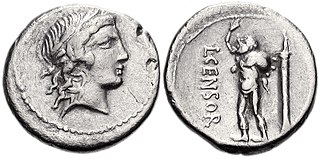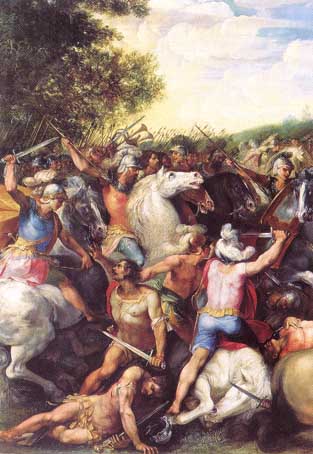Related Research Articles
Gaius Marcius Rutilus was the first plebeian dictator and censor of ancient Rome, and was consul four times.
Tribune of the plebs, tribune of the people or plebeian tribune was the first office of the Roman state that was open to the plebeians, and was, throughout the history of the Republic, the most important check on the power of the Roman Senate and magistrates. These tribunes had the power to convene and preside over the Concilium Plebis ; to summon the senate; to propose legislation; and to intervene on behalf of plebeians in legal matters; but the most significant power was to veto the actions of the consuls and other magistrates, thus protecting the interests of the plebeians as a class. The tribunes of the plebs were typically found seated on special benches set up for them in the Roman Forum. The tribunes were sacrosanct, meaning that any assault on their person was punishable by death. In imperial times, the powers of the tribunate were granted to the emperor as a matter of course, and the office itself lost its independence and most of its functions.

Lucius Minucius Esquilinus Augurinus was a Roman politician who was consul in 458 BC and decemvir in 450 BC.

The gens Marcia, occasionally written Martia, was one of the oldest and noblest houses at ancient Rome. They claimed descent from the second and fourth Roman Kings, and the first of the Marcii appearing in the history of the Republic would seem to have been patrician; but all of the families of the Marcii known in the later Republic were plebeian. The first to obtain the consulship was Gaius Marcius Rutilus in 357 BC, only a few years after the passage of the lex Licinia Sextia opened this office to the plebeians.

The gens Sempronia was one of the most ancient and noble houses of ancient Rome. Although the oldest branch of this gens was patrician, with Aulus Sempronius Atratinus obtaining the consulship in 497 BC, the thirteenth year of the Republic, but from the time of the Samnite Wars onward, most if not all of the Sempronii appearing in history were plebeians. Although the Sempronii were illustrious under the Republic, few of them attained any importance or notice in imperial times.

Marcius Censorinus was a name used by a branch of the plebeian gens Marcia of ancient Rome. The cognomen Censorinus was acquired through Gaius Marcius Rutilus, the first plebeian censor, whose son used it. The gens Marcia claimed descent from both Ancus Marcius, a king of Rome, and symbolically from Marsyas the satyr, who was associated with free speech and political liberty; see further discussion at Prophecy and free speech at Rome. The Marcii Censorini were consistent populares, supporting Marius, Cinna, Julius Caesar, and Antonius.

The gens Hostilia was an ancient family at Rome, which traced its origin to the time of Romulus. The most famous member of the gens was Tullus Hostilius, the third King of Rome; however, all of the Hostilii known from the time of the Republic were plebeians. Several of the Hostilii were distinguished during the Punic Wars. The first of the family to obtain the consulship was Aulus Hostilius Mancinus in 170 BC.
The gens Verginia or Virginia was a prominent family at ancient Rome, which from an early period was divided into patrician and plebeian branches. The gens was of great antiquity. It frequently filled the highest honors of the state during the early years of the Republic. The first of the family who obtained the consulship was Opiter Verginius Tricostus in 502 BC, the seventh year of the Republic. The plebeian members of the family were also numbered amongst the early tribunes of the people.
Lucius Marcius Censorinus was a Roman politician and military leader of the Middle Republic, serving as consul with Manius Manilius in 149 BC and censor in 147 BC. He led the fleet during the first phase of the Third Punic War.

Gaius Marcius Censorinus was a Roman Senator who was elected consul in 8 BC.
Gaius Marcius Censorinus was a late Roman Republican politician and soldier who participated in the first civil war of the Roman Republic, against Sulla.
The gens Duronia was a plebeian family at ancient Rome. Although relatively obscure, the family was of sufficient importance to hold a seat in the Roman Senate. Its members are mentioned during the first and second centuries BC.
The gens Duilia or Duillia was a plebeian family at ancient Rome. The first of the gens to achieve prominence was Marcus Duilius, tribune of the plebs in BC 470. The family produced several important statesmen over the first three centuries of the Republic, before fading into obscurity.
Gaius Julius Iulus was a member of the Roman gens Julia, and was nominated dictator in 352 BC.
The gens Poetelia or Poetilia was a plebeian family at ancient Rome. Members of this gens are first mentioned in the time of the Decemvirs, and from thence down to the Second Punic War, they regularly held the chief magistracies of the Roman state. After this, however, they fade into obscurity, and are only occasionally mentioned. The nomen Poetelius is sometimes confused with Petillius, and can be found with either a single or double 'l'.
Publius Valerius Poplicola was a Roman politician and general in the mid 4th century BC who served as Roman Consul, Praetor, Dictator, and Magister Equitum during his career.
Publius Cornelius Arvina was a Roman politician and general who lived in the late 4th century and early 3rd century BC, who served as consul of the Roman Republic twice, and as censor once.
Decimus Junius Brutus Scaeva was a Roman politician and consul in 325 BC.